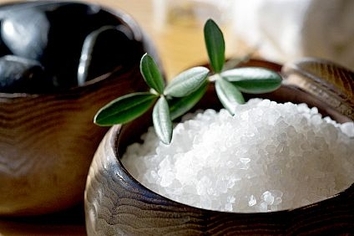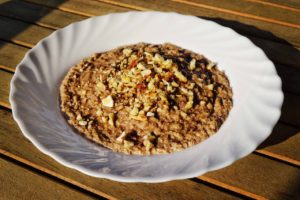Athletes are constantly on the search for the latest and greatest training and recovery supplements, however, one of the most effective has been around for hundreds of years. Epsom salt is a mineral that was first extracted from sea water in the British town of Epsom in 1618. This salt, also called Magnesium sulphate, when added to warm bath water, can help alleviate muscle pain even as intense as that found in fibromyalgia. It has also been shown to reduce swelling, relieve stress, improve circulation, soften skin and improve mood. These minerals are absorbed effectively through the skin, providing almost instant relief from muscle aches and pains incurred on long training runs or other activities causing overexertion of large muscle groups.
Performance Benefits
Since magnesium is a common co-factor assisting in many physiological reactions throughout the body, it is no surprise that it is in great demand in the high performance athlete. Magnesium is involved in muscle regeneration reactions all of which are key during post training recoveries; these reactions involve protein synthesis, neuromuscular transmitters and the activation of B complex. Another consideration in athletes is their increased requirements for protein, which along with high intakes of calcium and vitamin D increase magnesium requirements.
Stress and intense exercise deplete the body of magnesium making you more vulnerable to muscle cramps, body aches and grouchy moods after a long workout. Soaking in Epsom salt baths after running or extensive training can help prevent inflammation and irritation in your joints and muscles. You can also use this same warm Epsom salt water solution to treat sprains, strains or sore muscles.
Female Athletes
Female athletes in particular can benefit from increased magnesium intake. Magnesium and serotonin deficiencies have been found to exacerbate PMS symptoms. Studies show that starting Epsom salt baths as early as two weeks before your period will lead to less pain and significantly fewer negative mood changes frequently associated with menses.
Due to the high physiological demand for magnesium in female athletes increasing the frequency of Epsom salt baths will assist in preventing unpleasant cramping and fatigue which is likely to become more prominent prior to your period.
Magnesium and Mood
Magnesium functions as a significant co-factor in the conversion of tryptophan, an amino acid, to the neurotransmitter serotonin. Serotonin helps balance mood and promotes relaxation. Excessive intake of alcohol or a poor diet can lead to a magnesium deficiency, which, in turn, can result in low levels of serotonin. Therefore it is no surprise that a common symptom of magnesium deficiency is sadness or a mood imbalance due to a lack of this critical neurotransmitter.
Why Epsom Salt Baths?
Magnesium is a known laxative. Because oral magnesium is not available in controlled release form, there is no way to combat the laxative effects of oral magnesium. Bathing avoids the magnesium’s laxative effect by allowing for the absorption of magnesium (and other minerals) through the skin. Bathing allows the body to absorb as much magnesium as it needs in order to relax large muscle groups after a stressful day at the office or a long training run, without the side effects of orally ingested magnesium.
How to make an Epsom salt bath
Just one Epsom salt bath a week can have an incredible impact on your health and emotional wellness.
Making an Epsom salt bath is simple:
1. Break out your favorite rubber ducky.
2. Fill bathtub with hot or warm water.
3. Add between two and four cups of Epsom salt to the water.
4. Mix the water with your hands and allow the Epsom salt to dissolve.
5. Add five to ten drops of your favorite essential oil just before you step in the tub to maximize stress reduction. Some common choices are lavender, rose or chamomile essential oils.
6. Soak in the bath for about 15 minute but no longer to avoid reabsorbing the toxins eliminated by the Epsom salt.
7. Shower immediately after the bath to rinse the Epsom salts from your skin, which can dry your skin.
8. Caution: Epsom salt, due to its high magnesium content, is a laxative. Swallowing of the bath water, especially by a child, could lead to increased bowel movements. As always watch your children during bath time.
Author: Dr. Karen Lamb, NMD, LPC





When I originally commented I clicked the “Notify me when new comments are added” checkbox and now each time a comment is added
I get four emails with the same comment. Is there any way you can remove people from that service?
Cheers!
Great blog here! Also your web site loads up fast!
What host are you using? Can I get your affiliate link
to your host? I wish my web site loaded up as quickly as
yours lol
Hello every one, here every person is sharing such know-how, thus it’s good to read this blog, and I
used to pay a visit this web site daily.
Thanks for sharing your info. I really appreciate your efforts and I am waiting for your further
write ups thank you once again.
Your style is unique compared to other folks I have read stuff from.
I appreciate you for posting when you’ve got the opportunity,
Guess I will just book mark this blog.
I would like to thank you for the efforts you have
put in penning this site. I’m hoping to view the same
high-grade blog posts from you in the future as well.
In truth, your creative writing abilities has motivated me to get
my very own blog now 😉
Hi there! This is my first visit to your blog! We are a
team of volunteers and starting a new project in a community in the same niche.
Your blog provided us beneficial information to
work on. You have done a outstanding job!
Hello puravidanaturalmedicine.com webmaster, Your posts are always well-written and easy to understand.
To the puravidanaturalmedicine.com owner, You always provide helpful information.
Hello puravidanaturalmedicine.com webmaster, Your posts are always insightful and valuable.
Hello puravidanaturalmedicine.com admin, Nice post!